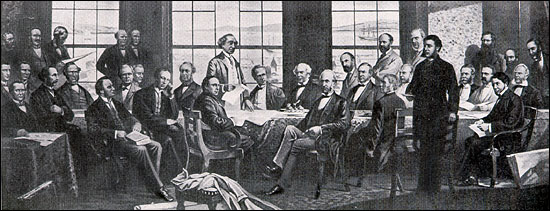The Quebec Conference, October 1864
The Quebec Conference, which continued the discussions at Charlottetown, began on 10 October and lasted two weeks. John A. Macdonald of Upper Canada (Ontario) favoured a legislative union - that is, all important decisions should be made by a single, central government and legislature. He pointed out that the American Civil War could be attributed in part to the existence of overly-powerful state governments, and an insufficiently powerful central government. However, the Maritime delegates opposed this degree of centralisation, and those from Lower Canada (Quebec) insisted on control over language, religion and civil law.

The result was a compromise - a federal system, in which each province would have its own legislature, and powers were divided between the federal and provincial governments. There was also the problem of adequate representation for smaller provinces in the federal parliament.
The House of Commons, with 194 members, was to be based on representation by population. This meant that Upper and Lower Canada would dominate the House, with 75 percent of the seats. Prince Edward Island was annoyed at only being allotted six MPs. Newfoundland did somewhat better with eight MPs.
Theoretically, this imbalance was to be corrected by a regional basis of representation in the Senate. However, the delegates from the Atlantic colonies failed to push for equal provincial representation on the United States model, and accepted sectional equality instead. Upper and Lower Canada would each get 24 members, and the three Maritime provinces together 24 members, with an additional four Senate members for Newfoundland. This once again meant domination by central Canada. The situation was made worse by the decision that Senators would be appointed for life by the federal government This "ensured that the Senate would have no moral authority to challenge the governing party in the House of Commons and limited its effectiveness as the guardian of regional interests." (Buckner 1994, 377)
The financial arrangements again reflected the Canadian agenda. The new federal government would assume the public debts of the future provinces up to a certain maximum, and would control all the major sources of revenue. The provinces would be compensated by a federal transfer of 80 cents per head. Newfoundland, because it had a small public debt, would receive an additional grant based on the difference between its debt per head, and the average in the Canadas, New Brunswick and Nova Scotia.
The Newfoundland delegates feared that even so, as a province, the colony would not be able to raise enough money in provincial taxation to meet local expenses. The Conference decided that provinces could levy direct taxes only. No such taxes were collected in Newfoundland, and it would be difficult to do so. The result was an agreement whereby Newfoundland would transfer control of its ungranted Crown lands and minerals to the federal government in return for an annual grant of $150,000. This provision was unique to Newfoundland, and was highly contentious.
Overall, the Quebec resolutions, which envisaged a strong federal government and relatively weak provincial governments, reflected the dominant role played by the Canadian delegates. Further, the resolutions implied the subordination of the future Atlantic provinces to central Canada - as a result of relatively weak presence in the federal parliament, and of financial arrangements which left them without adequate resources. Their delegates agreed to the resolutions in part because they felt they had little alternative, in part because they had much in common with the Canadian leaders.
The resolutions were controversial everywhere, except perhaps in Upper Canada. Anti-confederate movements sprang up in all the other jurisdictions, but it was only in Prince Edward Island (temporarily) and Newfoundland that they carried the day.




